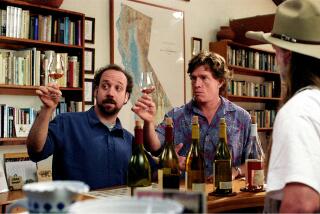Opinions pour from expanded ‘Mondovino’
- Share via
At once a punch-drunk love letter to the expressive possibilities of wine and a boozy rant against clubby wine-world politics, Jonathan Nossiter’s “Mondovino” is also among the most vigorous cinematic explorations of globalization and its discontents.
If formulaic fictions such as “Babel” or “Crash” harp on the paradoxical alienation of our interconnected lives, Nossiter’s documentary, given its premiere at the Cannes Film Festival in 2004, portrays globalization as a homogenizing force at the service of modern capitalism. In “Mondovino,” the wine industry’s ongoing battle between small local producers and international big money is shown as one between, to quote New York-based wine importer Neal Rosenthal, one of the film’s talking heads, “the resistance and the collaborators.”
Four years after the U.S. release of “Mondovino,” Nossiter, a trained sommelier and an established independent fiction filmmaker (he directed “Signs and Wonders” and “Sunday”), is still sharpening his polemic. He recently published a book, “Liquid Memory: Why Wine Matters,” which expands on many of the film’s themes. And this week, KimStim/Kino International releases “Mondovino” as a four-disc DVD set ($59.95) in truly epic form: a 10-part, 10-hour series. The feature-length version ran about 2 1/2 hours.
You can see why Nossiter would have more to say about his subject, which opens up windows onto not just global economics but also the philosophy of agriculture and the mysteries of taste. In making “Mondovino,” he amassed more than 500 hours of footage, shot over four years on three continents, in five languages -- all of which Nossiter, the son of a foreign correspondent, speaks fluently.
Though the feature had the feel of a hectic travelogue, the series slows things down to a brisk ramble, even though many episodes hop freely and repeatedly between Europe and the States. Both its heroes and its antagonists have more room to develop. Chief among the former are the embattled artisanal vintners, including the Columbu family in Sardinia and the De Montilles in Burgundy, whose wines are site-specific expressions of the vaunted notion of terroir (a geologically and environmentally derived sense of place).
The leaders of the latter camp are the all-powerful wine critic Robert Parker and the in-demand oenologist Michel Rolland, whose favorite command to his clients apparently is to “micro-oxygenate!”
The 10-chapter structure sets up expectations of tight thematic arcs that Nossiter doesn’t quite fulfill. If anything, the digressive bent of the feature is given free rein here, as is the jagged aesthetic. The hand-held, perpetually distracted camera conveys energy and curiosity -- it also pleasantly suggests slight inebriation -- but it can get wearying.
Some tangents are less interesting than others; an observation about new-oak wines being a kind of cosmetic procedure did not, for instance, warrant a visit to an actual plastic surgeon. There’s also an over-reliance on unsubtle cross-cutting to highlight differences of opinion or taste or class. The technique seems especially easy in the episode that toggles between clueless Napa winery owners and their Mexican migrant workers.
This large-scale documentary is a solid work of investigative reporting, but it’s also advocacy journalism. Nossiter is a partisan, and his film is constructed to advance a point of view. Still, it isn’t accurate to compare this cosmopolitan bon vivant to Michael Moore, as some critics have done. Nossiter can be seen and heard throughout “Mondovino,” and though his line of questioning or even his camera angles often suggest how he feels about his interviewees, he isn’t much of a grandstander. He doesn’t browbeat his subjects; he has a special talent for getting them comfortable enough to let down their guard on camera.
“Mondovino” is more than a treatise on the culture and business of wine. Nossiter has said that its ideas about money, power and creeping uniformity apply equally to the film world. They are certainly relevant to any realm where art and commerce collide, where the profit motive encourages compromise, where tastemakers are careful to serve the industry that feeds them.
In other words, “Mondovino” should spark second thoughts not just about the wine we drink but about our choices and habits as cultural consumers, about what we’re told to like and why.
More to Read
Only good movies
Get the Indie Focus newsletter, Mark Olsen's weekly guide to the world of cinema.
You may occasionally receive promotional content from the Los Angeles Times.










